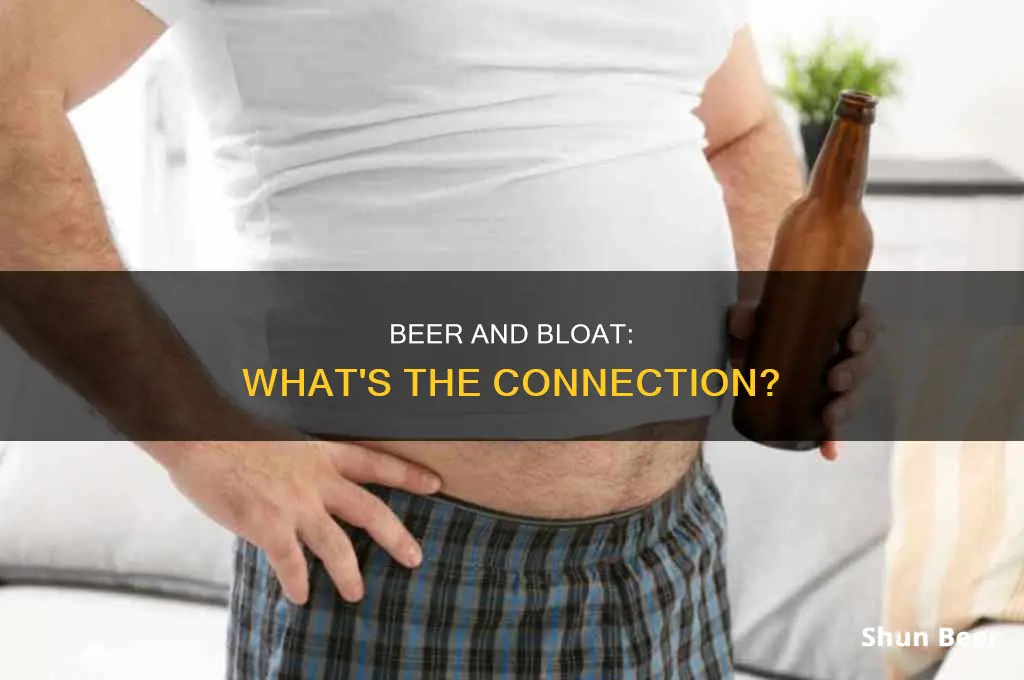
Beer is well-known for causing bloating, and for good reason. Alcoholic drinks are typically high in calories, with beer containing 153 calories per 12 fluid ounces. Beer, like other carbonated drinks, releases carbon dioxide gas into the body, which can lead to increased bloating and a heavy feeling. This is because the gas gets caught in the stomach, leading to abdominal distension. Beer also contains wheat, which means that those with celiac disease or gluten intolerance should avoid it.
| Characteristics | Values |
|---|---|
| Calories | Beer is calorie-dense, with a 12-ounce beer containing up to 153 calories. |
| Inflammation | Alcohol is an inflammatory substance that causes swelling in the body, including the stomach lining. |
| Dehydration | Alcohol is a diuretic that leads to dehydration, causing the body to retain water and resulting in bloating. |
| Carbonation | Carbonated drinks release carbon dioxide gas into the body, increasing bloating. |
| Mixers | Sugary and carbonated mixers can worsen inflammation and contribute to gas, discomfort, and bloating. |
| Weight Gain | Alcohol's high-calorie content can lead to weight gain, which may be mistaken for bloating. |
| Gastritis | Alcohol increases the risk of gastritis by raising acid levels in the stomach, causing inflammation and irritation. |
| Irritable Bowel Syndrome (IBS) | Alcohol can worsen IBS symptoms, including bloating. |
| Indigestion | Alcohol irritates the stomach, increasing acid production, and causing indigestion. |
| Nutrient Absorption | Prolonged alcohol consumption can impair the stomach's ability to absorb nutrients. |
What You'll Learn

Beer is carbonated, which can cause bloating
The carbonation in beer comes from the fermentation process, where yeast converts the sugars in the beer into alcohol. This process produces carbon dioxide as a by-product, which is then dissolved in the beer to create those tiny bubbles. When you drink a carbonated beverage like beer, you're swallowing all those little bubbles of gas, which can get trapped in your stomach.
The amount of carbonation in beer can vary depending on the brewing process and the type of beer. For example, some beers are known for being "heavily carbonated" or "highly carbonated," while others may have a more subtle fizz. Either way, the carbonation can contribute to that bloated feeling.
Additionally, the carbonation in beer can also cause you to burp more than usual. This is because the gas needs to escape from your stomach, and burping is one way for it to be released. So, if you find yourself burping a lot after drinking beer, it's likely due to the carbonation.
It's worth noting that the carbonation in beer isn't the only factor that can contribute to bloating. Beer also contains calories, carbohydrates, and sugar, which can all play a role in bloating as well. However, if you're specifically concerned about the carbonation causing bloating, you may want to opt for a less carbonated beer or choose a different type of alcoholic beverage that isn't carbonated.
If you're looking to avoid bloating altogether, it's best to avoid carbonated drinks entirely, as they will all have a similar effect on the body. This includes not only beer but also other carbonated alcoholic drinks like prosecco, champagne, and carbonated mixers.
Exploring Jordan's Beer Culture and Drinking Laws
You may want to see also

Alcohol is inflammatory and can irritate the digestive tract
Alcohol is an inflammatory substance, meaning it causes swelling in the body. This inflammation can cause irritation in the digestive tract, leading to bloating. Alcohol can irritate the stomach and increase acid levels, causing a condition called gastritis, or inflammation of the stomach lining. This can result in stomach pain and discomfort, and if left untreated, can lead to chronic gastritis and stomach ulcers.
Alcohol can also worsen inflammation in the body due to the mixers that are often combined with it. Sugary and carbonated mixers, syrups, sweeteners, and flavorings can increase gas, discomfort, and bloating. Alcohol is also a diuretic, which means it causes dehydration. When the body is dehydrated, it tries to retain as much water as possible, leading to water retention and puffiness or swelling.
In addition to causing inflammation and irritation in the digestive tract, alcohol can also contribute to weight gain, which may be mistaken for bloating. Alcoholic drinks are typically high in calories, and frequent drinking can lead to weight gain and the formation of a "beer belly."
To prevent or reduce alcohol-induced bloating, it is recommended to drink water before, during, and after consuming alcohol. This can help prevent dehydration and reduce the inflammatory effects of alcohol on the body. It is also advisable to avoid carbonated and sugary drinks, as well as drinking slowly to reduce the amount of air swallowed.
Beer and Suboxone: What's the Verdict?
You may want to see also

Alcohol is high in calories, which can lead to weight gain
The high calorie content of alcohol can contribute to weight gain, particularly around the midsection, leading to the well-known "beer belly." This weight gain can be attributed to the dense and heavy calories found in alcoholic drinks, as well as the additional sugar and carbs in cocktails and similar drinks. A single drink can contain 50 to several hundred calories and just as many grams of sugar.
The weight gain associated with alcohol consumption can be managed through lifestyle changes, such as reducing alcohol intake, maintaining a balanced diet, and engaging in regular physical activity. It is recommended that women consume no more than one drink per day, while men should limit themselves to no more than two drinks per day. This can help prevent weight gain and other problems related to alcohol use.
In addition to weight gain, alcohol can also cause bloating due to inflammation and irritation in the stomach. Alcohol increases the production of stomach acid, which can lead to a condition called gastritis, or inflammation of the stomach lining. This inflammation can cause discomfort and, in extreme cases, damage to the stomach lining. Alcohol can also contribute to dehydration, which can further exacerbate bloating and weight gain.
Heart Surgery and Beer: What's Safe to Drink?
You may want to see also

Alcohol is dehydrating, causing the body to retain water
Alcohol is a diuretic, which means drinking it can cause dehydration. When the body is dehydrated, it tries to retain as much water as possible by holding on to water as a survival tactic. This leads to water retention, which can make you look puffy or swollen.
Alcohol can also irritate the stomach, causing it to produce more acid than usual. This excess acid can lead to a condition called gastritis, which involves inflammation of the stomach lining. This inflammation can create discomfort and, in extreme cases, damage the stomach lining. If the damage continues over time, the lining of the stomach will break down, leading to stomach ulcers.
Drinking carbonated beverages such as beer or other bubbly drinks can also contribute to bloating. The gas released from carbonated drinks gets trapped in the stomach, adding to the volume and discomfort.
To prevent alcohol-induced bloating, it is recommended to drink water along with alcoholic beverages. Staying hydrated can help reduce the inflammatory effects of alcohol on the body.
In summary, alcohol is dehydrating, causing the body to retain water, which can lead to bloating and other negative health effects. It is important to drink in moderation and stay hydrated to minimize the impact of alcohol on the body.
Drinking Alcohol-Free Beer: Safe Driving?
You may want to see also

Alcohol can worsen symptoms of conditions like IBS
Drinking alcohol can lead to inflammation and irritation in the stomach, resulting in bloating that may last a few days but, in some cases, can persist for longer. Alcohol can also cause weight gain, giving the appearance of bloating. This weight gain is due to the high number of calories in many alcoholic drinks.
Alcohol is an inflammatory substance, meaning it causes swelling in the body. This inflammation is often made worse by mixers that tend to be full of sugar and carbon dioxide, leading to bloating and discomfort. Alcohol also dehydrates the body, causing the skin and vital organs to retain water and swell up.
For individuals with IBS, drinking alcohol will often cause a flare-up of symptoms, including bloating. Alcohol aggravates the gastrointestinal symptoms of IBS, which include abdominal pain, cramping, and a change in bowel habits.
If you have IBS, you may need to give up drinking entirely or limit your alcohol consumption and make changes to your drinking habits. Choosing drinks with limited carbonation and sugar content may help reduce the likelihood of an IBS flare-up.
In addition to worsening IBS symptoms, heavy drinking can also lead to other negative consequences for an individual's physical health and well-being. These include liver damage, stomach lining damage, impaired cognitive function, a heightened risk of injury, a weakened immune system, and cardiovascular damage.
Drinking Beer at Work: Is It Ever Okay?
You may want to see also
Frequently asked questions
Drinking beer can make you bloated because it is carbonated and releases carbon dioxide gas into the body, which leads to increased bloating. Beer also contains a lot of calories, which can lead to weight gain and a "beer belly".
To prevent bloating from drinking beer, it is recommended to drink water in between alcoholic drinks. Drinking slowly and avoiding salty foods can also help reduce bloating.
Other drinks that can cause bloating include wine, carbonated beverages, coffee, and milk for those who are lactose intolerant.







